Post
A catch
Save a catch to start your fishing logbook. You will be able to to share it with the community if yo want!
A fishing trip
Post an ad to go fishing with other fishermen
Save a catch to start your fishing logbook. You will be able to to share it with the community if yo want!
Post an ad to go fishing with other fishermen
Share a thought, a question with the community
My favorite cities
×Join our 1 fisherman and our 1 cofisherman in Dickinson-Center in Franklin. The fishing forecast is currently 3.2. The most caught fishes here are the walleye, the white bass, the chinook salmon and the muskellunge. Come try the most famous fishing techniques like the trolling for mackerel, angling - using floats, surfcasting or fishing bream from a dock or jetty.
Our fishing forecast of Dickinson Center indicates the best time to go fishing in this city.
The Walleye
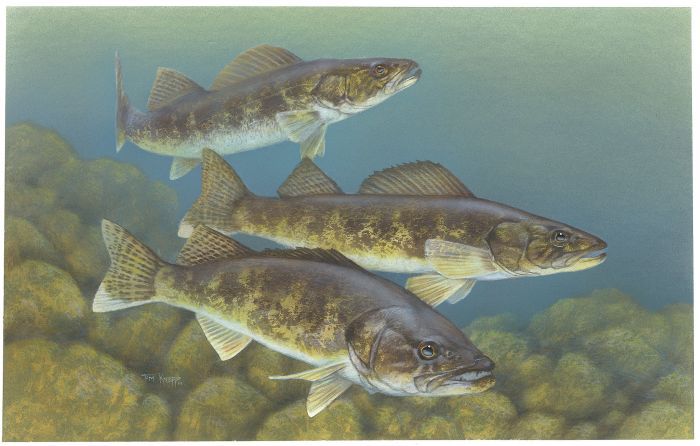
The Walleye belongs to the Percidae family. They can reach 107 cm in length and reach 11 kg. The average weight is about 5 kg. Walleye can live 10 to 20 years. They spawn in the spring or early summer. It can be fished from May to March. Walleye are freshwater fish of the Percidae family, a popular and commonly supplied game fish. The body is long and thin, mainly golden and olive colored, with a white belly. The back is crossed with five or more black stripes. They have two dorsal fins - one spiny and one with softened rays. The mouth of the walleye is wide, with sharp teeth, and its low-light vision helps it to find its prey at night.
The Walleye is a famous fish you can catch in Dickinson Center.The White Bass
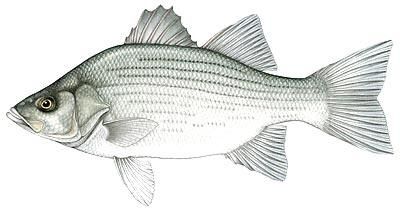
The White Bass belongs to the Moronidae family. Its maximum length is 46 cm and its maximum weight is 3.2 kg. Its maximum lifespan is 15 years. Spawning takes place from March to May. The best time to catch it is from mid-April to mid-May. As with other true basses, the dorsal fin is clearly double, separated into thorny and soft-raked parts. White Bass is a silvery shade ranging from dark grey or black on the back to white on the belly. Several incomplete lines or stripes extend horizontally on either side of the body. Adults look like a young striped bass, and the two are often confused. However, the striped bass has two distinct pieces of teeth on the back of the tongue, and the white wolf has one piece of tooth. The striped bass has two points on each cap, unlike the white bass which has one, and the second spine of the anal fin measures about half of the third spine of the striped bass, while it is about two thirds the length of the third spine in White Bass.
The White Bass is a famous fish you can catch in Dickinson Center.The Chinook Salmon
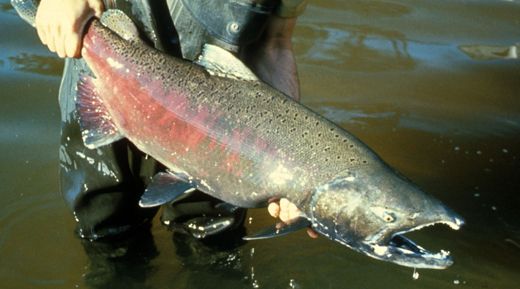
The Chinook Salmon belongs to the Salmonidae family. This salmon can reach 1.5 m for more than 60 kg and a lifespan of 9 years. It breeds from September to December. It is caught from July to September. The Chinook is blue-green, has purple on the back and top of the head with silvery sides and white belly. It has black spots on his tail and upper half of his body. Its mouth is often dark purple in color.
The Chinook Salmon is a famous fish you can catch in Dickinson Center.The Muskellunge
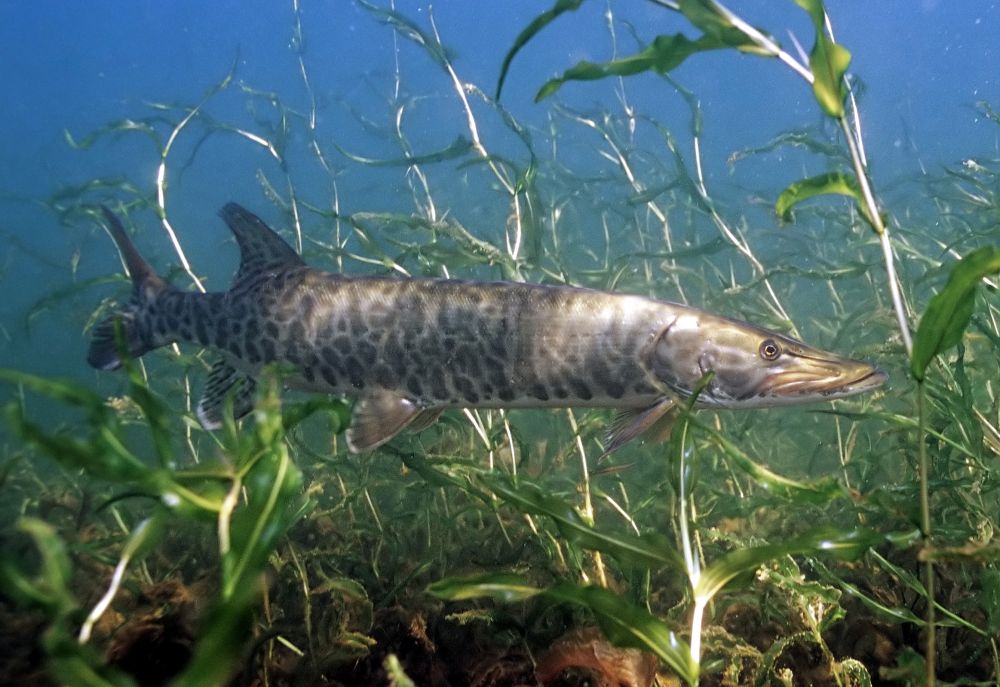
The Muskellunge belongs to Esocidae family. It can reach 150 cm of length for 30 kg. It has a lifespan of 30 years. They spawn in springs. It can be fished all year round. The sides vary from greenish to brownish to silvery, usually with dark marks, but marks may be absent. The white or cream belly often has brownish or greyish spots. The dorsal and anal fins, located far away on the body, range from greenish to brownish to blood-red and generally have dark marks. The duckbill jaws have long, pointed teeth: the roof of the mouth has shorter, curved tooth pads. The cheek cover and gills have scales on the upper half only. The underside of the jaw has sensory pores, the numbers varying from 12 to 20, but the number is generally 15 to 18.
The Muskellunge is a famous fish you can catch in Dickinson Center.The American Eel
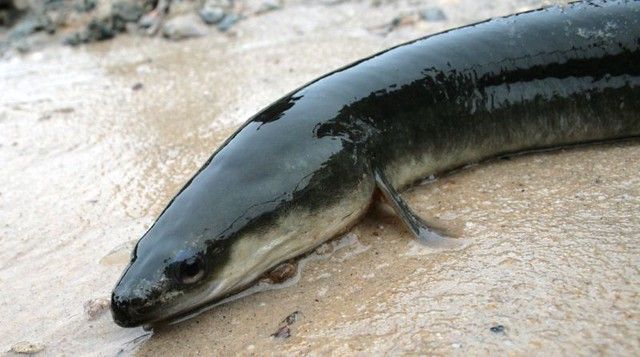
The American Eel belongs to the Anguillidae family. The size of the adult female can reach 1 m in length, while that of the male does not exceed 40 cm. Spawning takes place in mid-winter. Females lay 3 to 22 million eggs. He can live to be 50 years old. It can be fished from April to September. The American eel is a species of fish with a snake-like body all in length with fins that extend over its back, around its tail and along its inner surface. It has thick lips and a slightly longer lower jaw than her upper jaw, which gives her the appearance of having an overbite. The color of young eels varies from yellow-green or brown. Adult eels are grey with white or cream bellies.
The American Eel is a famous fish you can catch in Dickinson Center.Our fishing forecast of Dickinson Center indicates the best time to go fishing in this city.
Our fishing forecast of Dickinson Center indicates the best time to go fishing in this city.
Our fishing forecast of Dickinson Center indicates the best time to go fishing in this city.
